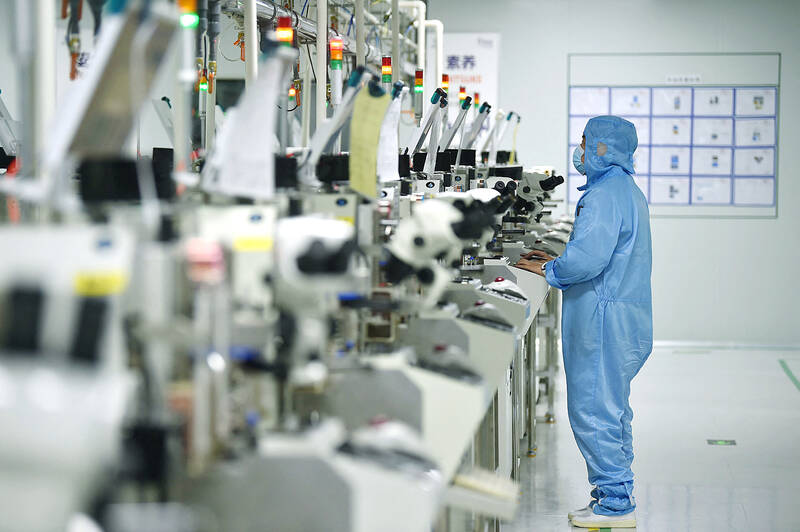China is considering new tax incentives for high-end manufacturing companies, person familiar with the matter said, as Beijing seeks to bolster the economy and encourage more innovation in technology to counter US competition.
The tax policy being considered could save advanced manufacturers hundreds of billions of yuan, said the person, who asked not to be identified because the information is not public.
The plan is still subject to approval and could change, the person said.

Photo: AFP
China’s post-COVID-19 economic rebound is losing momentum, with the latest data showing exports and investment weakening across the board, a recovery in the property market fizzling and unemployment among young people soaring to a record. Chinese stocks have slumped, the yuan has breached seven yuan to the US dollar, and prices of key commodities such as copper and iron ore have plunged as investors reassess the outlook for the world’s second-largest economy.
Chinese President Xi Jinping (習近平) cited a “modern industrial system” as one of China’s top economic priorities at a high-profile meeting earlier this month, prompting expectations that Beijing would roll out measures such as subsidies for manufacturers.
A Chinese State Council meeting this month also discussed supporting the country’s advanced manufacturing businesses, which covers a wide range of industries from new materials, chips and artificial intelligence to biopharmaceutics.
The Chinese Ministry of Finance did not immediately respond to faxed questions seeking information.
The government had previously announced tax breaks this year of 1.8 trillion yuan (US$254.3 billion), down from a record 4.2 trillion yuan last year as the economy gradually recovers.
A move to boost tax incentives suggests officials might be growing more concerned about the outlook.
The planned tax breaks for high-end manufacturers also provide further evidence that Beijing is prioritizing support for a sector that is key to supply chain security, particularly in semiconductors, as tension with the US and its allies intensifies.
Last year, the People’s Bank of China provided more than 200 billion yuan in relending loans for commercial banks to encourage cheap lending to manufacturers and other sectors.
Despite the government’s support, manufacturers have seen their revenues and profits squeezed because of falling demand. Factory activity contracted last month for the first time in four months, while data this weekend showed manufacturing profits plunged 27 percent in the first four months of the year from the same period last year.
However, the government’s ability to apply large-scale fiscal stimulus is limited. Revenue from land sales, a key source of income for local governments, has plummeted because of the downturn in the property market, while debt risks have climbed.
China’s tax income weakened to 13.8 percent of GDP last year from 17 percent in 2018 after the government made aggressive tax cuts in previous years to boost the economy.
Chinese Minister of Finance Liu Kun (劉昆) has said there could be “outstanding conflicts” between income and spending this year.

Semiconductor business between Taiwan and the US is a “win-win” model for both sides given the high level of complementarity, the government said yesterday responding to tariff threats from US President Donald Trump. Home to the world’s largest contract chipmaker, Taiwan Semiconductor Manufacturing Co (TSMC, 台積電), Taiwan is a key link in the global technology supply chain for companies such as Apple Inc and Nvidia Corp. Trump said on Monday he plans to impose tariffs on imported chips, pharmaceuticals and steel in an effort to get the producers to make them in the US. “Taiwan and the US semiconductor and other technology industries

SMALL AND EFFICIENT: The Chinese AI app’s initial success has spurred worries in the US that its tech giants’ massive AI spending needs re-evaluation, a market strategist said Chinese artificial intelligence (AI) start-up DeepSeek’s (深度求索) eponymous AI assistant rocketed to the top of Apple Inc’s iPhone download charts, stirring doubts in Silicon Valley about the strength of the US’ technological dominance. The app’s underlying AI model is widely seen as competitive with OpenAI and Meta Platforms Inc’s latest. Its claim that it cost much less to train and develop triggered share moves across Asia’s supply chain. Chinese tech firms linked to DeepSeek, such as Iflytek Co (科大訊飛), surged yesterday, while chipmaking tool makers like Advantest Corp slumped on the potential threat to demand for Nvidia Corp’s AI accelerators. US stock

The US Federal Reserve is expected to announce a pause in rate cuts on Wednesday, as policymakers look to continue tackling inflation under close and vocal scrutiny from US President Donald Trump. The Fed cut its key lending rate by a full percentage point in the final four months of last year and indicated it would move more cautiously going forward amid an uptick in inflation away from its long-term target of 2 percent. “I think they will do nothing, and I think they should do nothing,” Federal Reserve Bank of St Louis former president Jim Bullard said. “I think the

SUBSIDIES: The nominee for commerce secretary indicated the Trump administration wants to put its stamp on the plan, but not unravel it entirely US President Donald Trump’s pick to lead the agency in charge of a US$52 billion semiconductor subsidy program declined to give it unqualified support, raising questions about the disbursement of funds to companies like Intel Corp and Taiwan Semiconductor Manufacturing Co (台積電). “I can’t say that I can honor something I haven’t read,” Howard Lutnick, Trump’s nominee for commerce secretary, said of the binding CHIPS and Science Act awards in a confirmation hearing on Wednesday. “To the extent monies have been disbursed, I would commit to rigorously enforcing documents that have been signed by those companies to make sure we get